-
 Bitcoin
Bitcoin $117700
-1.00% -
 Ethereum
Ethereum $4458
-3.91% -
 XRP
XRP $3.119
0.14% -
 Tether USDt
Tether USDt $1.001
-0.02% -
 BNB
BNB $836.6
-1.56% -
 Solana
Solana $189.5
-3.90% -
 USDC
USDC $0.9998
-0.02% -
 Dogecoin
Dogecoin $0.2335
1.29% -
 Cardano
Cardano $0.9642
1.51% -
 TRON
TRON $0.3539
-1.19% -
 Hyperliquid
Hyperliquid $47.41
-1.84% -
 Chainlink
Chainlink $21.92
-3.28% -
 Stellar
Stellar $0.4286
-0.23% -
 Sui
Sui $3.724
-3.29% -
 Bitcoin Cash
Bitcoin Cash $594.8
-0.78% -
 Ethena USDe
Ethena USDe $1.001
0.04% -
 Hedera
Hedera $0.2501
-2.06% -
 Avalanche
Avalanche $23.96
-4.87% -
 Litecoin
Litecoin $119.0
-2.32% -
 Toncoin
Toncoin $3.473
0.82% -
 UNUS SED LEO
UNUS SED LEO $9.596
0.17% -
 Shiba Inu
Shiba Inu $0.00001301
-0.39% -
 Uniswap
Uniswap $11.03
-0.25% -
 Polkadot
Polkadot $3.935
-2.62% -
 Dai
Dai $1.000
0.01% -
 Bitget Token
Bitget Token $4.564
-1.76% -
 Cronos
Cronos $0.1512
-4.11% -
 Ethena
Ethena $0.7306
-1.09% -
 Pepe
Pepe $0.00001087
-2.68% -
 Aave
Aave $300.2
-4.00%
What is the smart contract interaction process for wallet addresses?
A wallet address interacts with smart contracts by sending signed transactions that trigger specific functions, enabling actions like token transfers or approvals on the blockchain.
Jun 16, 2025 at 10:56 am
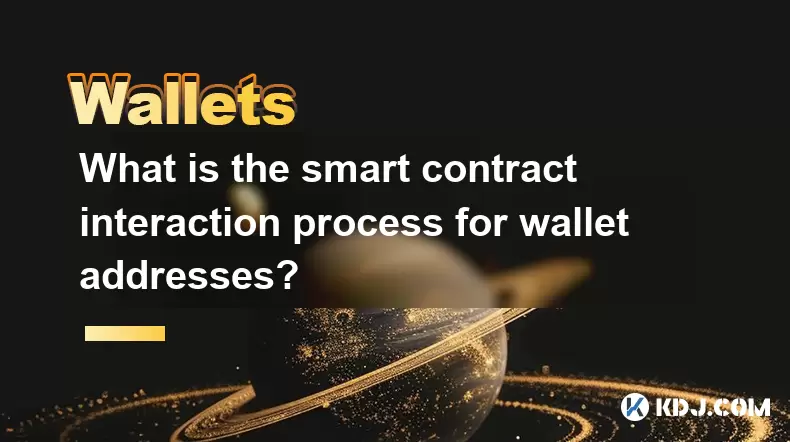
What is the Smart Contract Interaction Process for Wallet Addresses?
Smart contract interaction through wallet addresses lies at the heart of decentralized applications (dApps) and blockchain-based ecosystems. Understanding how a wallet address interacts with smart contracts is crucial for developers, users, and investors engaging with Ethereum or other EVM-compatible blockchains.
How Do Wallets Communicate With Smart Contracts?
A wallet address is essentially a public key derived from a private key used to sign transactions. When interacting with a smart contract, the wallet does not directly run code but sends signed transactions that invoke specific functions within the deployed smart contract.
These interactions are possible because each smart contract has an on-chain address and a defined Application Binary Interface (ABI). The ABI specifies what functions can be called and how data should be formatted. When a user initiates an action—like transferring tokens or approving a spender—the wallet constructs a transaction based on the ABI and sends it to the network.
What Happens When a Wallet Sends a Transaction to a Smart Contract?
Once a transaction is sent from a wallet, it goes through several stages before execution:
- Signing: The wallet signs the transaction using the user's private key, ensuring authenticity.
- Broadcasting: The signed transaction is broadcasted to the Ethereum network via nodes.
- Mining/Validation: Miners or validators pick up the transaction and include it in a block after verifying its validity.
- Execution: The Ethereum Virtual Machine (EVM) runs the smart contract function specified in the transaction.
During execution, if the function modifies the state (e.g., updating balances), these changes are permanently recorded on the blockchain. If the function is a read-only call (view/pure), no transaction is mined, and the result is returned instantly without altering the blockchain state.
What Are the Different Types of Interactions Between Wallets and Smart Contracts?
Wallets interact with smart contracts in multiple ways depending on the function being executed:
- Function Calls: Invoking functions like
transfer(address, uint256)orapprove(address, uint256)on ERC-20 tokens. - Contract Deployment: Sending a transaction with contract bytecode to create a new contract on the blockchain.
- Reading Data: Querying contract storage variables such as balanceOf(address) without spending gas.
- Event Listening: Subscribing to events emitted by smart contracts, like Transfer or Approval logs.
Each interaction type requires different handling by the wallet. For instance, reading data doesn’t require signing, while writing data always involves a signed transaction and gas payment.
How Does Gas Work During Smart Contract Interactions?
Every interaction that alters the blockchain state consumes gas, which is paid in ETH or the native token of the chain being used. Gas fees depend on network congestion and complexity of the operation.
When a wallet sends a transaction to a smart contract, it must specify:
- Gas Limit: Maximum amount of gas the sender is willing to spend.
- Gas Price: Amount of ETH per unit of gas (or base fee + priority fee in post-EIP-1559 transactions).
The wallet estimates these values based on current network conditions. If the gas limit is too low, the transaction fails and the gas is still consumed. If it's too high, unused gas is refunded.
What Tools and Standards Enable Wallet-Smart Contract Communication?
Several standards and tools facilitate seamless communication between wallets and smart contracts:
- ERC-20, ERC-721, ERC-1155: These token standards define how wallets can interact with fungible and non-fungible tokens.
- Web3.js / Ethers.js: JavaScript libraries used by dApps and wallets to interface with the blockchain.
- MetaMask Inpage Provider: Allows websites to request wallet interactions via injected web3 providers.
- WalletConnect: Protocol enabling secure communication between mobile wallets and dApps via QR codes or deep links.
These tools abstract much of the complexity behind sending and receiving transactions, making it easier for users to engage with smart contracts without needing technical expertise.
Frequently Asked Questions
Q: Can a wallet address own a smart contract?
Yes, when a wallet deploys a smart contract, that wallet becomes the deployer and owner unless ownership is transferred. Ownership often grants special permissions within the contract.
Q: Why do some smart contract interactions fail even with enough funds?
Interactions may fail due to insufficient gas limits, incorrect function parameters, or reverts within the contract logic (e.g., failed require statements).
Q: Is it safe to approve unlimited token access to a smart contract?
Approving unlimited access can pose risks if the contract behaves maliciously. It’s generally safer to approve only the necessary amount rather than granting full access.
Q: Can I cancel a transaction once sent from my wallet to a smart contract?
Once a transaction is confirmed on the blockchain, it cannot be canceled. However, if it's still pending, you may replace it with a higher gas price transaction using the same nonce.
Disclaimer:info@kdj.com
The information provided is not trading advice. kdj.com does not assume any responsibility for any investments made based on the information provided in this article. Cryptocurrencies are highly volatile and it is highly recommended that you invest with caution after thorough research!
If you believe that the content used on this website infringes your copyright, please contact us immediately (info@kdj.com) and we will delete it promptly.
- Kazakhstan's Crypto Leap: Bitcoin ETF and Central Asia's Digital Finance Future
- 2025-08-13 12:45:19
- BlockDAG Presale Blazes Past $371M: Fundraising Frenzy Fuels Crypto Sensation
- 2025-08-13 13:05:21
- Meme Coins: Chasing the 2025 Surge – Which Will Moonshot?
- 2025-08-13 10:25:23
- Bitcoin's Wild Ride: Rally, Pullback, and What's Next
- 2025-08-13 10:25:23
- Bitcoin, Bitmax, and Institutional Demand: A New Era of Crypto Investment
- 2025-08-13 10:45:12
- Solana, ROAM, and Airdrops: What's the Buzz in 2025?
- 2025-08-13 11:35:13
Related knowledge
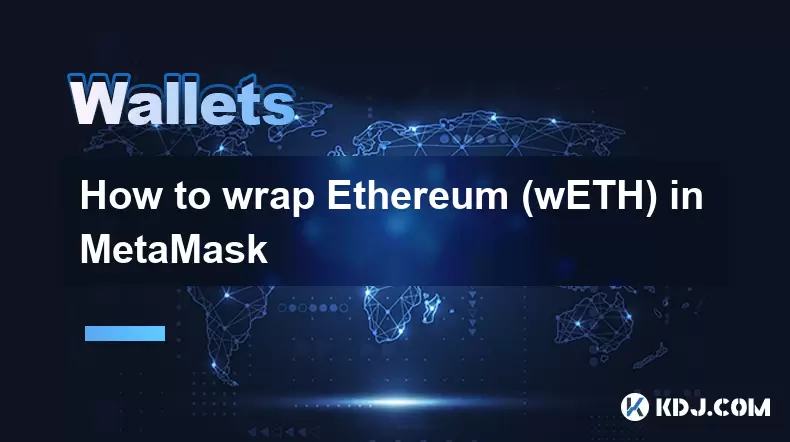
How to wrap Ethereum (wETH) in MetaMask
Aug 13,2025 at 11:36am
Understanding Wrapped Ethereum (wETH)Wrapped Ethereum (wETH) is a tokenized version of native Ethereum (ETH) that conforms to the ERC-20 standard, ena...

How to manage your portfolio in Exodus wallet
Aug 08,2025 at 10:07pm
Understanding the Exodus Wallet InterfaceThe Exodus wallet is a non-custodial cryptocurrency wallet that supports a wide range of digital assets. When...
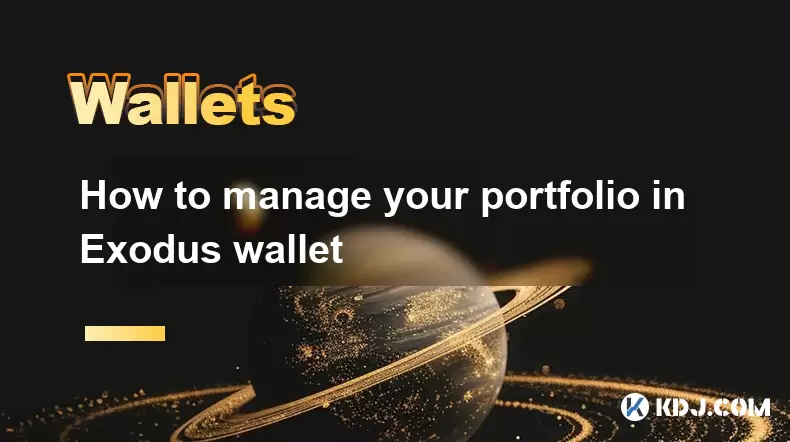
How to manage your portfolio in Exodus wallet
Aug 13,2025 at 11:35am
Understanding the Exodus Wallet InterfaceThe Exodus wallet is a non-custodial cryptocurrency wallet that supports a wide range of digital assets. Upon...

How to reset your MetaMask password
Aug 08,2025 at 01:28pm
Understanding the MetaMask Password Reset ProcessMany users confuse the MetaMask password with the seed phrase or private key, but they serve differen...
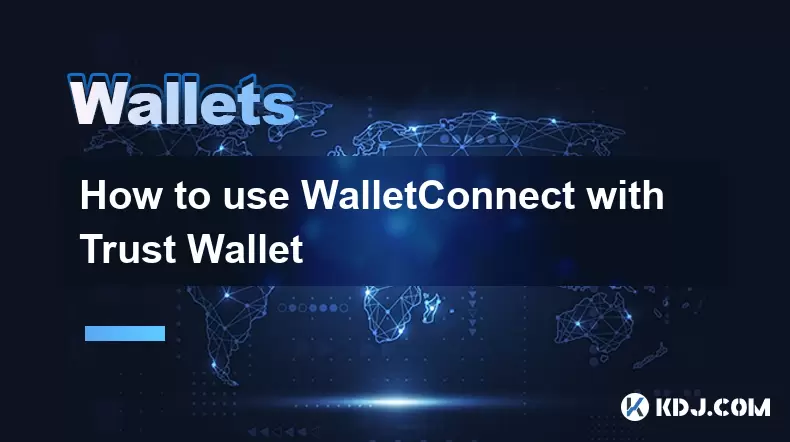
How to use WalletConnect with Trust Wallet
Aug 13,2025 at 01:07am
What Is WalletConnect and Why It Matters for Trust Wallet UsersWalletConnect is an open-source protocol that enables secure communication between dece...
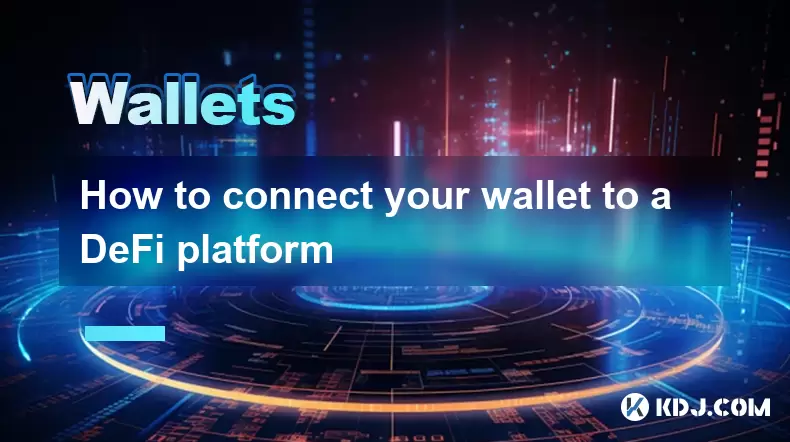
How to connect your wallet to a DeFi platform
Aug 13,2025 at 11:36am
Understanding Wallet Compatibility with DeFi PlatformsBefore connecting your wallet to any DeFi platform, it's essential to ensure your wallet is comp...

How to wrap Ethereum (wETH) in MetaMask
Aug 13,2025 at 11:36am
Understanding Wrapped Ethereum (wETH)Wrapped Ethereum (wETH) is a tokenized version of native Ethereum (ETH) that conforms to the ERC-20 standard, ena...

How to manage your portfolio in Exodus wallet
Aug 08,2025 at 10:07pm
Understanding the Exodus Wallet InterfaceThe Exodus wallet is a non-custodial cryptocurrency wallet that supports a wide range of digital assets. When...

How to manage your portfolio in Exodus wallet
Aug 13,2025 at 11:35am
Understanding the Exodus Wallet InterfaceThe Exodus wallet is a non-custodial cryptocurrency wallet that supports a wide range of digital assets. Upon...

How to reset your MetaMask password
Aug 08,2025 at 01:28pm
Understanding the MetaMask Password Reset ProcessMany users confuse the MetaMask password with the seed phrase or private key, but they serve differen...

How to use WalletConnect with Trust Wallet
Aug 13,2025 at 01:07am
What Is WalletConnect and Why It Matters for Trust Wallet UsersWalletConnect is an open-source protocol that enables secure communication between dece...

How to connect your wallet to a DeFi platform
Aug 13,2025 at 11:36am
Understanding Wallet Compatibility with DeFi PlatformsBefore connecting your wallet to any DeFi platform, it's essential to ensure your wallet is comp...
See all articles

























































































